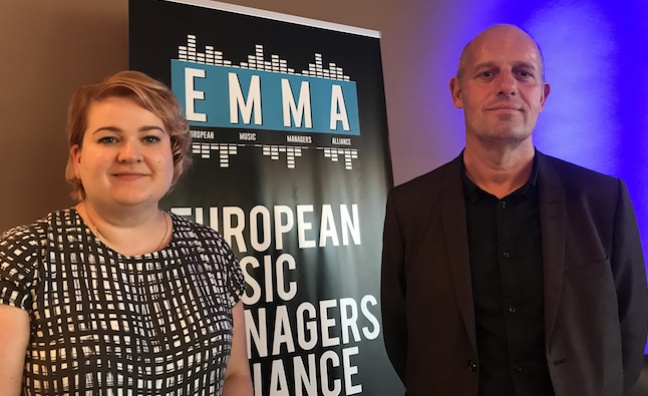The European Music Managers Alliance (EMMA) has entered the Fix Streaming debate.
The umbrella body representing music managers for thousands of artists, songwriters, musicians, producers and DJs is joining calls for urgent changes to the recorded music business and streaming.
EMMA said its proposed reforms would enable a “wider diversity of creators and businesses can benefit from the growth of music streaming”.
The trade body has entered the debate at a time when an influential UK parliamentary committee is set to investigate the economics of streaming. Organisations including the Ivors Academy have led the calls for change.
Recorded music industry revenues are now powered by streaming. Last year, streaming revenue hit 56.1% of global revenues, according to IFPI.
In a statement, EMMA suggested that artists and other music creators are losing out on this income because of “commercial inefficiencies alongside outdated licensing and contractual practices”.
EMMA is calling for four changes to be implemented as a matter of urgency to help rebalance the music economy:
A new contract between artists and major music corporations – “Analogue royalty rates should not apply to digital income, outdated deductions should be removed, and un-recouped balances reviewed after a reasonable period of time. Artist debt should not be carried forwards for decades. On a wider scale, the licensing of digital music services should better reflect the diversity of Europe’s recorded music sector. This complex ecosystem is populated by hundreds of thousands of SMEs, and it is time to end practices whereby three major labels receive substantial, upfront and unattributable payments as part of their licensing agreements.”
Eliminating ‘black box’ distributions – “While unidentified and non-matched writers revenues (ending up as so-called black box money) will frequently belong to the lowest earning songwriters, they are typically reallocated by market share to the highest-earning, or to those with inside knowledge of Performance Rights Organisation (PRO) mechanisms. This is unjustifiable, is not in the interests of PROs’ wider membership and needs reform with immediate effect. New incentives are required to compel PROs to declare the size of unidentified royalty collections, and to ensure the amount of unidentified and non-matching royalties is lowered by a globally unified account system used by all PROs.”
The trialing of new payment models for streaming – “To counter stream manipulation and fraud, and to boost consumer confidence in streaming models, EMMA would like to see a full and transparent trial of what are known as user-centric payment systems. This method of distribution would reconnect the music played by streaming subscribers with the revenue received by artists and songwriters.”
A coordinated reopening of music markets – “The ongoing global pandemic requires a unified response. The music and cultural industries of Europe need EU-wide strategies to restart and reopen, financially supporting artists’ businesses to return post-pandemic.”
EMMA is also calling on European governments to implement the Copyright Directive in full, though the UK government has indicated that it will not enact the EU legislation.
For its own future, we need the industry itself to act
Per Kviman
Per Kviman, of Versity Music (Sweden) and chair of EMMA, said: “When live music shut down in Europe and across the world, the incomes of artists, songwriters, producers, DJs and their wider teams went into freefall. They are fast becoming the collateral damage of Covd-19. The robustness and growth of music streaming through the pandemic should have been a lifeline to these people. However, because of fundamental inequalities with how streaming services are licensed and how revenues are distributed, the vast majority are being cut further adrift.
“For its own future, we need the industry itself to act. EMMA is not alone in recognising this or in raising our collective voice, although as music managers we also urge all EU countries to implement the EU Copyright Directive Articles 17-23 to enable real changes of improved fairness between rightsholders and creators, as well as improved remuneration between DSPs and rightsholders. We will not accept being let down by the industry, by governments or EU policy makers. The crisis is right in our faces. Action needs to be taken now.”
Virpi Immonen, of Fullsteam Management (Finland) and vice-chair of EMMA, said: “As music managers, we love and embrace streaming technology, much of which originated in Europe and has returned the recorded music business to growth. We have adapted from a market dependent upon the unit sales of CDs and downloads, to one built around access and streams. These changes have shifted the dynamics of our business forever, but without a similar realignment of contracts, licensing practices and revenue distribution we risk disenfranchising the creative talent on who our entire industry depends.”
Founded in 2018, the European Music Managers Alliance (EMMA) brings together representatives from Music Managers Forums in Finland, France, the Netherlands, Norway, Poland, Sweden and the UK.
* To make sure you can access Music Week wherever you are, subscribe to our digital issue by clicking here.










